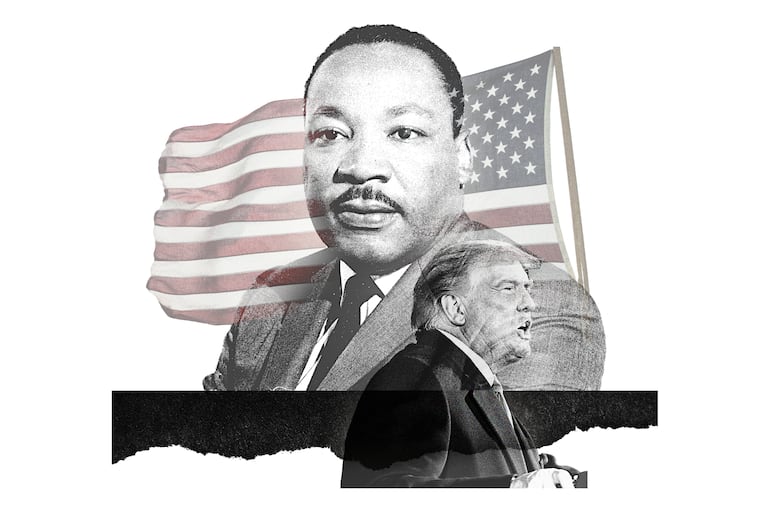On a day to celebrate Martin Luther King Jr.’s dream, the Trump nightmare returns
Where King's vision was rooted in the American dream, in liberty and justice for all, Trump’s is fueled by pettiness, vengeance, division, and flagrant inequality of justice in action.

Since the U.S. first began observing a federal holiday to honor Martin Luther King Jr. in 1986, the day has twice overlapped with a public presidential inauguration: Bill Clinton in 1997 and Barack Obama in 2013.
It will happen again Monday when convicted criminal Donald Trump is sworn in a second time.
If it wasn’t a cruel calendar coincidence, I’d swear the universe was messing with us.
On a day meant to honor one man’s dream for America, we’ll also be ushering in the nightmare of another.
Where King envisioned a nation where people are judged by the content of their character, not the color of their skin or their background, Trump was sued for racial discrimination in the 1970s, called for the execution of four innocent Black and Latino teenagers in the 1980s, and has continued to perpetuate discriminatory actions throughout his life and in his presidency.
Where King believed in fulfilling the promises of the Declaration of Independence and the Constitution, which he called “great wells of democracy,” Trump — who was impeached twice — has consistently sought to undermine the republic in ways great and small, including by abusing his office for personal gain, using law enforcement to clear protesters so he could hold up a Bible for a photo op, and trying to overturn the 2020 election.
Where King’s vision was rooted in the American dream, in liberty and justice for all, Trump’s is fueled by pettiness, vengeance, division, and flagrant inequality of justice in action.
Ten days before his inauguration, Trump was sentenced to an unconditional discharge, meaning he faced no penalties, for hush-money payments to an adult film star before the 2016 election.
And so, instead of walking into a jail cell, Trump — who has threatened to be a “dictator” on Day One of his second term — will take the nation’s center stage, where he is expected to sign several executive orders that include:
Starting mass deportations of migrants.
Ending birthright citizenship to target children born of undocumented immigrants.
Reinstating travel bans.
Rolling back Biden administration policies on, well, almost everything.
Reshaping the federal government by firing federal employees he considers his enemies within.
Pardoning
patriotscriminals who were convicted for their role in the insurrection he incited at the U.S. Capitol on Jan. 6, 2021.
The convergence of dates — a collision between the dreamer and the schemer — has been called many things:
An insult, a mockery.
A cruel twist of fate.
A cosmic joke on the same level as Trump comparing himself, and his crowd sizes, with King.
When I called on the Rev. Mark Kelly Tyler, the former pastor of Mother Bethel African Methodist Episcopal Church, he wasted no time characterizing the juxtaposition as “deeply disturbing.”
Tyler was one of the Philadelphians I sought out ahead of November’s election to talk about how we might best cope with the possibility of a Trump 47 presidency.
I turned to him again on the eve of Trump’s second inauguration to talk about how some are choosing to cope — or not — with the dueling dates, from choosing to celebrate King on a different day to spending Monday in service instead of stress-watching the surreal spectacle.
What a blow to what could have been. Imagine, if you will, the imagery and inspiration if, on this MLK Day, we were inaugurating our first Black woman and person of South Asian descent to the presidency.
A dream deferred.
But not lost, Tyler reminded me.
Never lost.
Tyler, a historian, said in these challenging days, he is reminded of other setbacks — including the end of Reconstruction in 1877 after the inauguration of the 19th president, Rutherford B. Hayes.
Progress may have rolled back, but it wasn’t permanently halted.
In one of his more popular speeches, which he delivered in 1965 on the steps of the Alabama state Capitol at the end of the march from Selma, King famously said, “The arc of the moral universe is long, but it bends towards justice.”
And yet, this year I found myself drawn more to one of his later works.
Just before he was shot and killed in 1968, King wrote his fourth and final book, Where Do We Go From Here: Chaos or Community? at a low point in his activism amid uncertainty about the movement’s future and a nation deeply embroiled in the Vietnam War.
It is a question as relevant today as it was back then.
It’s been long — too long — that the nation has waited to fulfill King’s dream. And I can imagine that for a lot of younger people for whom the 1960s might as well be the 1700s, this might all sound like magical thinking as the world burns.
But while the road and personalities may change, the direction doesn’t.
“Forward,” Tyler plainly said.
“There is no going backward,” he added. “There is no standing still. Forward may not be as fast as it would have been under a different president, but we march forward nonetheless.”
On this MLK Day especially, may the message of resilience and resistance ring louder than any coming from the Capitol in Washington.